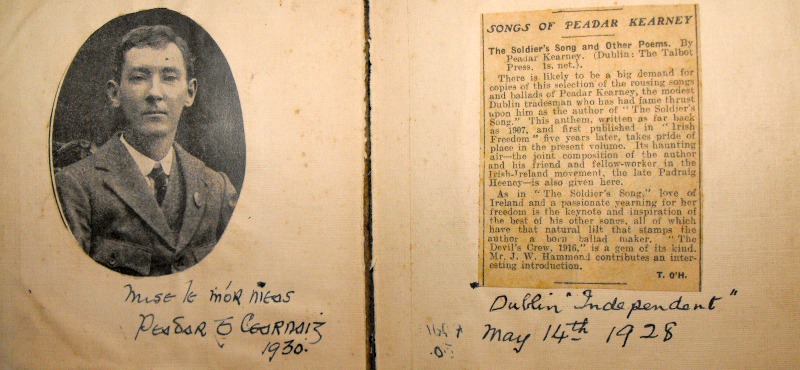

Testo di: Peadar Kearney (inglese), Liam O’ Rinn (gaelico)
Musica di: Patrick Heeney and Peadar Kearney
Adottato nel 1926.
Il testo di Amhrán na bhFiann, tre strofe e un ritornello, fu scritto nel 1907. Fu pubblicato per la prima volta sul giornale Irish Freedom nel 1912. Il ritornello da solo fu formalmente adottato come inno nazionale nel 1926, al posto del precedente inno God Save Ireland, usato ufficiosamente. Una parte dell’inno nazionale (i primi quattro versi seguiti dagli ultimi cinque) è anche il saluto presidenziale.
Esiste un movimento in Irlanda per sostituire l’inno a causa della sua natura militante e del suo tono anti-britannico. Inoltre viene detto che la melodia è difficile da suonare mentre altri sottolineano come l’intero inno sia stato spesso interpretato alla velocità sbagliata, come è accaduto nei recenti Giochi Olimpici.
Soldier’s Song
Testo in inglese
We’ll sing song, a soldier’s song,
With cheering rousing chorus,
As round our blazing fires we throng,
The starry heavens o’er us;
Impatient for the coming fight,
And as we wait the morning’s light,
Here in the silence of the night,
We’ll chant a soldier’s song.Chorus
Soldiers are we
whose lives are pledged to Ireland;
Some have come
from a land beyond the wave.
Sworn to be free,
No more our ancient sire land
Shall shelter the despot or the slave.
Tonight we man the gap of danger
In Erin’s cause, come woe or weal
‘Mid cannons’ roar and rifles peal,
We’ll chant a soldier’s songIn valley green, on towering crag,
Our fathers fought before us,
And conquered ‘neath the same old flag
That’s proudly floating o’er us.
We’re children of a fighting race,
That never yet has known disgrace,
And as we march, the foe to face,
We’ll chant a soldier’s songChorus
Sons of the Gael! Men of the Pale!
The long watched day is breaking;
The serried ranks of Inisfail
Shall set the Tyrant quaking.
Our camp fires now are burning low;
See in the east a silv’ry glow,
Out yonder waits the Saxon foe,
So chant a soldier’s song.Chorus
Amhrán na bhFiann
Testo in gaelico
Seo dhibh a cha/irde duan O/glaigh,
Cathre/imeach briomhar ceolmhar,
A/r dtinte cna/mh go buacach ta/id,
‘S an spe/ir go min re/altogach
Is fonnmhar faobhrach sinn chun gleo
‘S go tiu/nmhar gle/ roimh thi/ocht do’n lo/
Fe/ chiu/nas chaomh na hoiche ar seol:
Seo libh canai/dh Amhra/n na bhFiannCurfa
Sinne Firnna Fa/il
A ta/ fe/ gheall ag E/irinn,
buion da/r slua
Thar toinn do ra/inig chugainn,
Fe/ mho/id bheith saor.
Sean ti/r a/r sinsir feasta
Ni/ fhagfar fe/’n tiora/n na/ fe’/n tra/il
Anocht a the/am sa bhearna bhaoil,
Le gean ar Ghaeil chun ba/is no/ saoil
Le guna screach fe/ la/mhach na bpile/ar
Seo libh canai/dh Amhra/n na bhFiann.
Cois ba/nta re/idhe, ar a/rdaibh sle/ibhe,
Ba bhuachach a/r sinsir romhainn,
Ag la/mhach go tre/an fe/’n sa/r-bhrat se/in
Ta/ thuas sa ghaoith go seolta
Ba dhu/chas riamh d’a/r gcine cha/idh
Gan iompa/il siar o/ imirt a/ir,
‘S ag siu/l mar iad i gcoinne na/mhad
Seo libh, canai/dh Amhra/n na bhFiannCurfa
A bhui/on na/ch fann d’fhuil Ghaeil is Gall,
Sin breacadh lae na saoirse,
Ta sce/imhle ‘s scanradh i gcroi/the namhad,
Roimh ranna laochra a/r dtire.
A/r dtinte is tre/ith gan spre/ach anois,
Sin luisne ghle/ san spe/ir anoir,
‘S an bi/obha i raon na bpile/ar agaibh:
Seo libh, canai/dh Amhra/n na bh Fiann.Curfa